Results for “”


Buyer personas are a core component of any marketing strategy. The increasing emphasis on personalization in marketing campaigns contributes to raising their importance even further, given their role in custom-tailoring strategies to specific target audiences.
Furthermore, the direction granted by buyer personas enables teams to focus marketing and sales spending on leads most likely to convert, contributing to a healthy ROI. However, accurately creating and adjusting buyer personas can be difficult, and many marketers struggle with this when planning their strategies.
This guide demonstrates how to create a buyer persona based on research and data to empower demand generation campaigns and drive results.
Ideal Client Profiles (ICPs) are of great importance for your marketing and sales teams to understand how to engage the different audiences within your target market. This will likely be divided into companies of a certain size, within a particular revenue range, and/or with specific goals, etc. However, this target market must be categorized further in order to empower strategies with a more actionable comprehension of the members of the buying committees within target accounts.
Essentially, buyer personas fill this role by acting as fictional representations of a company’s ideal client, and are usually far more detailed than ICPs. Based on research and observable data, buyer personas are designed to describe the type of buyer who will value and most likely purchase your product in as much detail as possible.
Discover the key to creating an efficient Ideal Client Profile and its role in the roadmap for business growth with INFUSE Director of Strategic Accounts Jeff Cleasby’s B2B Marketing Journey
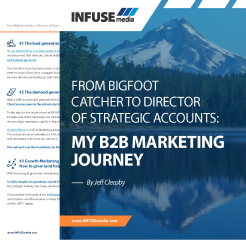




A target audience is a particular group of individuals who share traits that make them likely to purchase a product (in other words, they are who benefit the most from the offered solutions). The main difference between a target audience and a buyer persona is that the latter refers to an archetypal individual. Therefore, it is more detailed than a target audience (and is usually built within a certain target audience’s scope).
Marketers who create target audiences take into account geographic and demographic characteristics such as gender, age, location, interests, annual income, opinions, problems, and solutions. As a result, target audiences can be leveraged to uncover priority accounts to be targeted in ABM initiatives, for instance.
A buyer persona is a fictional representation of the decision maker within your ideal target accounts. Unlike the ICP, the focus is on an individual rather than on the company as a whole, which means their job role and aspirations are of utmost importance.
These are idealized versions of the people your sales team will engage within the buying groups of your target accounts, such as the buyer persona examples below:



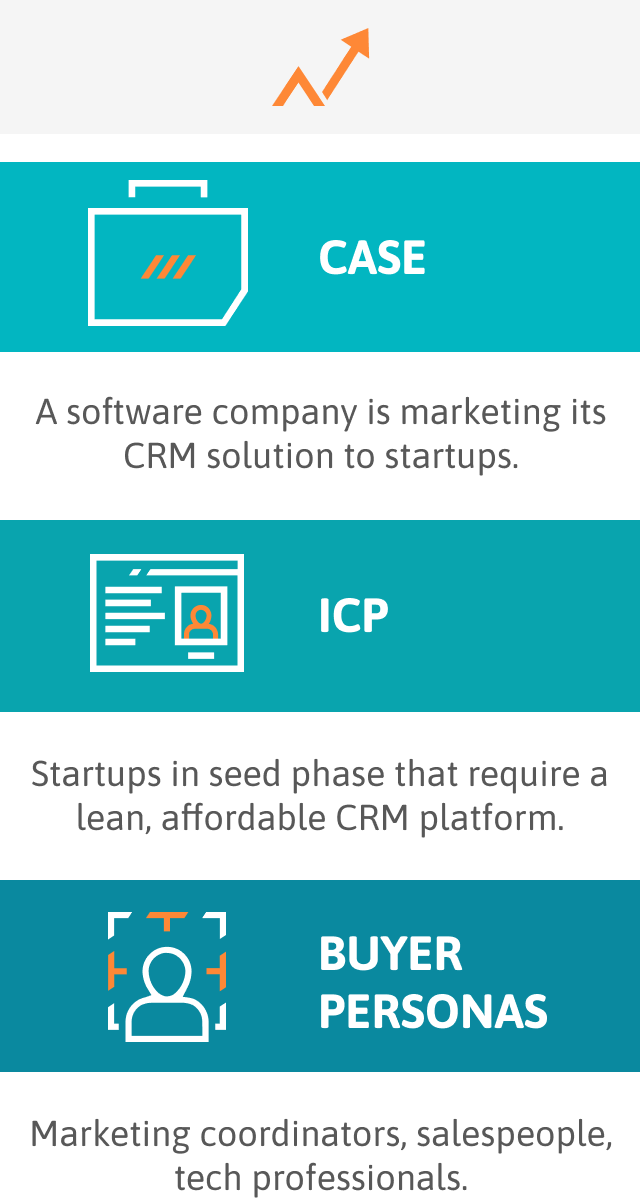
While introducing as much relevant information into buyer personas is certainly useful, they are unlikely to ever be 100% accurate as buyer behavior continuously evolves in line with external influences. Therefore, buyer personas, while an incredibly useful guide, require flexibility to ensure that marketing efforts do not overlook potential clients who are not a perfect match but still valuable.
Moreover, many entrepreneurs look at buyer personas with some skepticism, based on previous unsuccessful efforts. However, as noted by HubSpot, different myths still plague buyer persona initiatives, and must be kept in check, since many of these misaligned approaches are the root cause of such failures.
For instance, personality traits and exclusive characteristics, such as names and appearance, notwithstanding their widespread use in B2C marketing initiatives and frequent presence in persona-building guides, do not necessarily offer any insight on why a certain audience might be interested in your services.
Therefore, your personas should be created emphasizing the reasons why people buy or hire products and services—a jobs to be done (JTBD) approach is a useful option for keeping your efforts focused on the driving reasons behind purchases.
Furthermore, while it is true that the B2B buying process is more rational and data-backed, B2B buyers are just as human as B2C consumers, and therefore their emotions and personal values and beliefs still affect their decision making. According to Gartner, a typical buying group consists of 6 to 10 people involved in the purchasing process, each one with their own set of values and interests, as well as different spheres of influence within the buying process. Members of buying committees, under pressure to deliver performance, may even be facing the next step for their careers, for better or for worse, in the outcome of a purchase. All of these factors are powerful influencers for buying decisions and must be taken into consideration.
Keep up with the changing expectations of the market with insights from INFUSE Demand Expert Victoria Albert’s on The Evolution of the Marketer in 2023, part of Outlook 2023
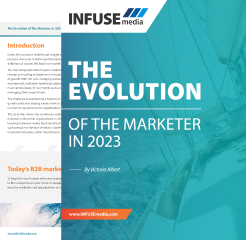
B2B buyer personas should be created to prioritize specific triggers such as pain points, business goals, and inefficiencies. Knowing the specifics of your potential buyers helps your business truly comprehend their issues and objectives, leading teams to better engage your client base, and ultimately fostering interdepartmental alignment.
Once you have created buyer personas, each department, from marketing to sales to client success (CS), will have a clear starting point to work from. Moreover, if you work with outsourced teams, personas can also be useful tools for educating team members and quickly bringing them up to speed. Your dedicated trainers and content producers will be able to use persona-based data to inform their work and make sure they are focusing the efforts of the entire team in the right direction.
This alignment leads your team members to recognize how their contributions relate to the larger organizational mission, and drives your company to achieve the best results.
Drive growth and deliver quality demand performance with 10 Best Practices for Sales and Marketing Alignment by INFUSE Founder & CEO Alexander Kesler

By understanding what your potential buyers want to know, what might pique their interest, and the solutions they yearn for, you can offer clients and prospects alike engaging, comprehensive information. Hence, it is essential for a company to maintain its personas up-to-date and data-driven, accounting for the ever-changing state of the market, and delivering on client expectations.
B2B buyers typically consume an average of 13 pieces of content before deciding a purchase (Martech, 2020), which demonstrates the importance of content marketing. A solid, data-backed buyer persona offers brilliant guidelines for your content strategies.
Buyer personas make it easier to regularly adapt and customize messages, content, and preferred channels, to avoid out of date, irrelevant, or generic information. This will result in increased value and performance from strategies and budgets by reducing wasted spending.
Guiding your prospects throughout the buying process with lead nurturing helps to both educate them on topics and products of interest, as well as establish your company’s value and earn their trust. Giving your prospects a special, individualistic experience will keep them coming back for more and eventually drive their conversion to a client.
Effective lead nurturing is made possible by clearly defining and comprehending your buyer personas, since they offer clear guidelines by which to personalize nurturing strategies. This way, your campaign avoids generic messaging, a fatal flaw of non-data-driven lead nurturing efforts.
Achieve the best nurturing results with our Definitive Guide to B2B Lead Nurturing
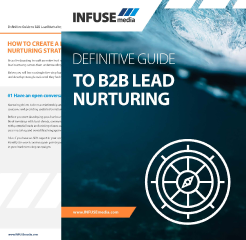
When researching your market it is important to analyze your audience’s preferred communication channels, as well as firmographic data and the average yearly revenue of your target accounts, among other relevant factors for your industry.
Social listening also offers relevant insights into problems, criticisms, and issues that interest your audience. By monitoring social media platforms for relevant keywords and brand mentions, as well as the channels of your competitors, you can gather data essential to further detail your buyer personas.
Furthermore, surveys are powerful tools to acquire relevant data. Develop online surveys and distribute them to your clients and prospects to gather information about their pain points, objectives, and preferences. Be sure to ask questions that are most pertinent to understanding how your audience finds and utilizes your solutions to directly inform each element of your buyer persona.
To summarize:
Existing clients and their insights on your services are very relevant sources of information to build your buyer personas. Focus groups, interviews, forms, surveys, and one-on-one conversations, among others, all offer a deep understanding of your target market. However, as these options require your clients to provide their time, make sure to provide reasonable incentives, fostering brand loyalty and engaging them to participate in these initiatives with interest.
Other than the information offered directly by your clients, the data you already have access to from existing partnerships can also be leveraged to inform your buyer persona. This data can reveal typical usage patterns, preferred devices, social media platforms, and search intent. Such information grants insight into the main problems your audience is facing and how they perceive your company as a solution, as well as into potential mistakes your brand may have committed in past campaigns.
To summarize:

Next, it is crucial to leverage the data collected in the research step to segment your audience, i.e., group buyers separately according to the data you have about them. This will give you a general idea of your buyer groups and how many buyer personas you may need to create.
Below are some variables leveraged by the most common segmentation methods for B2B enterprises. Be sure to visit the linked guides to learn more about each technique.

Now that you have completed all of your research and determined the various market segments to target, it is time to define your buyer personas.
Start by identifying correlations in your data—this will serve to build your distinctive buyer personas.
Below are some relevant elements to include when defining your buyer persona:

Buyers’ needs and behavior fluctuate and are subject to external influences. Thus, the accuracy of your personas should be assessed regularly to ensure their efficiency to ensure that necessary changes and updates can be actioned.
For instance, recent changes in the buyer’s journey in the wake of the pandemic increased the average number of touchpoints prior to a purchase from 17 to 27 in the space of two years—changes like these must be accounted for in your buyer personas to keep them effective.
Ensuring the quality of your data is crucial to maintain the accuracy of marketing efforts. Errors such as incomplete or missing information, duplicate entries and out of date elements, among others, are some data challenges that plague many companies and may keep them from fully relying on data-driven initiatives. However, many of these issues are avoidable with the correct tools, leaner techstacks and a data governance policy that enforces a quality standard.
For example, Artificial Intelligence (AI) and Machine Learning technology has already evolved to become a viable solution for helping to clean your database, purge duplicates, and autocomplete any missing information. Organizational alignment can also aid your company to avoid data silos—by streamlining work platforms and keeping different departments on the same page, you can avert the lack of compatibility between disparate systems and reduce duplicate entries. Furthermore, data enrichment services must be leveraged to ensure your data pools are updated—which is especially relevant with the fast-paced market changes happening in the wake of the COVID-19 pandemic.
By attending to these best practices, you can rest assured that your data-driven initiatives will provide healthy ROI and drive results.
Market research showed that some enterprises similar to those of current LingCorp clients often outsource their translation jobs to AI-backed translation initiatives, discovered through Google search and LinkedIn ads. Social listening revealed that the results are frequently unsatisfactory, but the reason why remained unclear.
Leveraging their proximity to their clients, the company promoted focus groups that revealed the poor quality of the translations is due to the still embryonic nature of this technology paired with jargon-heavy marketing copy: marketing companies prevail within the target audience, and the current AI being utilized was not meeting client expectations.
Earlier cold advertising efforts fostered a high influx of traffic, proving the efficiency of the current channel mix. However, the number of captured leads was lower than expected, which indicated the influence of a particular factor driving these prospects away.
A demographic analysis of their databases pointed to a predominance of female marketers in their early 30s, working in manager-level jobs in companies ranging from 100 to 500 employees. The social media profiles of these professionals featured a common trend of discourse centered on the rising importance of diversity within the workplace, especially for ventures looking to expand internationally—which reveals important psychographic input.



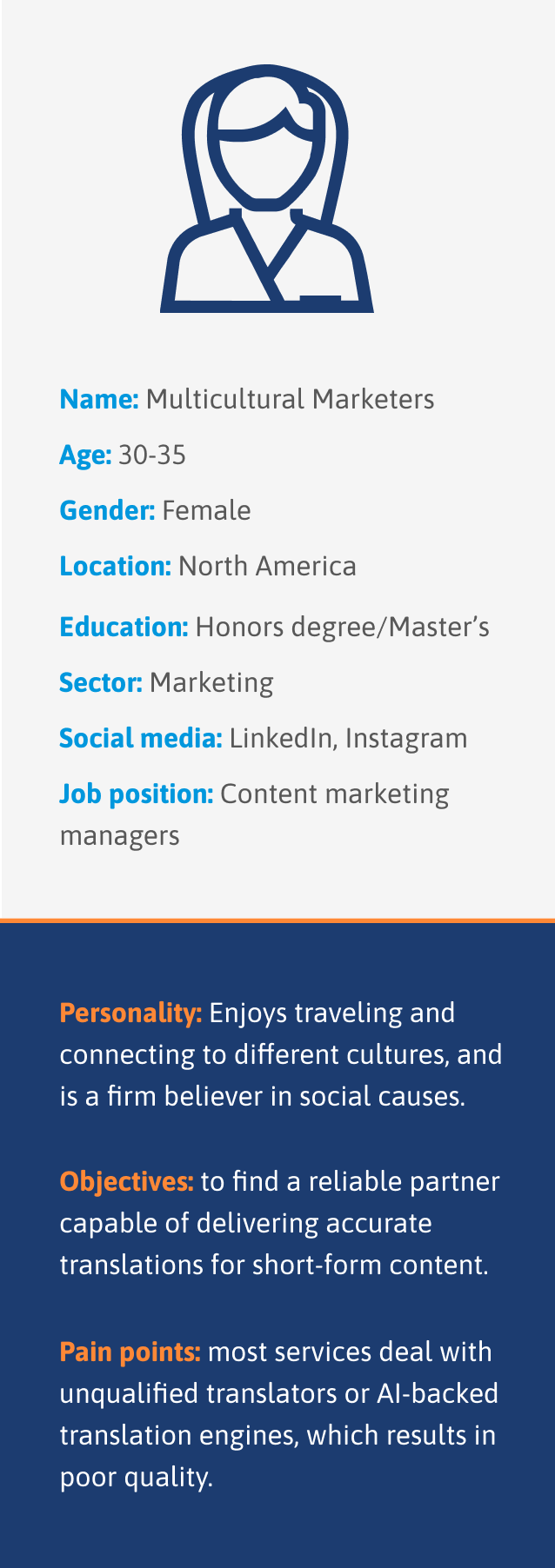
With this persona in mind, the company decided to target certain leads with content about the increase of businesses expanding internationally and their most common challenges. The article celebrated diversity within the workspace, detailed its many benefits, and presented a world map highlighting all the countries where their translation staff work, thanking them all for their contribution. The campaign simultaneously alleviates the insecurity of working with AI-backed translation, by drawing attention to the real people behind this initiative, and caters to the audience’s interest in diversity.
High click-through rates (CTRs) brought back many leads considered lost, and traffic to pages detailing products, services, and pricing increased, signaling further steps down the sales funnel.
This collected understanding of the persona’s roles within their companies’ buying processes, alongside other relevant firmographic data, will aid future marketing initiatives to properly nurture and guide these prospects.
Download our B2B Buyer Persona template to leverage your gathered data to build your own personas to focus your marketing efforts, drive results, and support organizational alignment
Buyer personas offer broad insight into many different characteristics of your company’s audience, regardless of their position within the sales funnel or the previous success rate of your deals.
When creating marketing campaigns, lead nurturing strategies, and sales tactics, taking the time to comprehend the people you are targeting—including their backgrounds, responsibilities, goals, and even personalities—gives you a significant advantage.
With data-driven buyer personas, you increase the likelihood that your marketing and sales initiatives will resonate with your audience with accuracy, and therefore be more successful.
Understanding the appropriate ways to back your buyer persona frameworks with observable data helps you learn crucial information about your prospects, and is thus essential for yielding exceeding campaign performance and sales goals.
By using the aforementioned examples as a guide, you can conduct your own research and create buyer personas that drive results.
To provide the best experiences, we use technologies like cookies to store and/or access device information. Consenting to these technologies will allow us to process data such as browsing behavior or unique IDs on this site. Not consenting or withdrawing consent, may adversely affect certain features and functions.